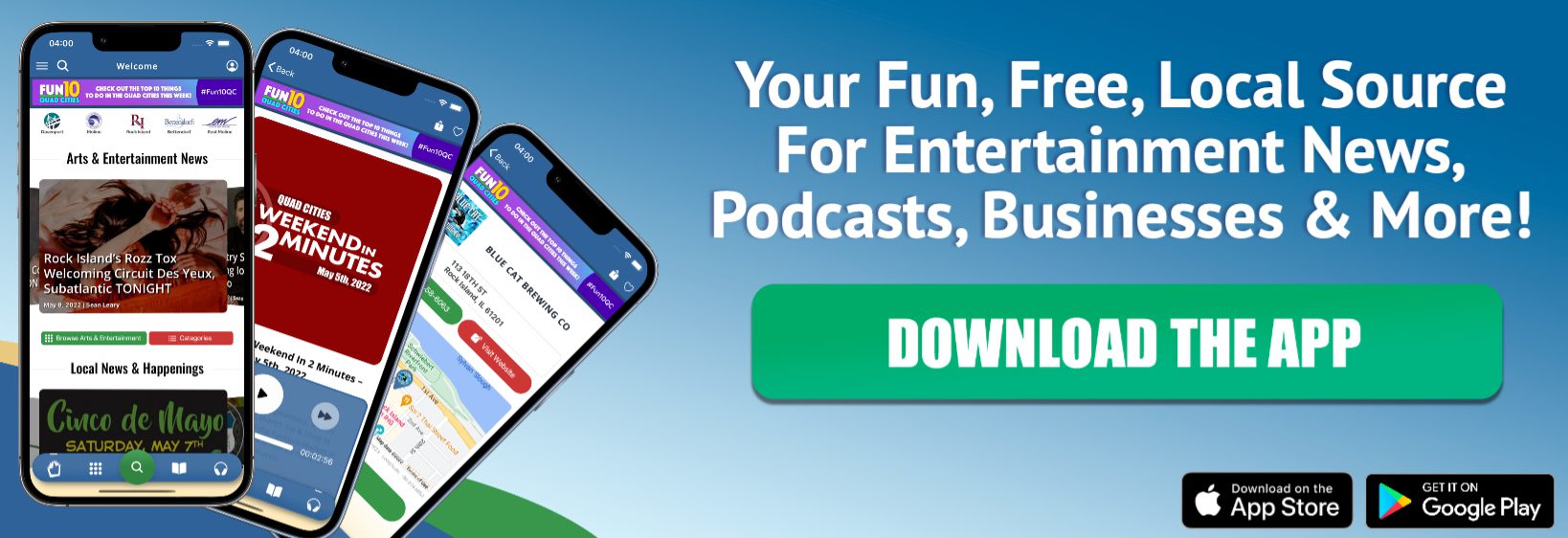Mississippi Valley Regional Blood Center Adapts During Covid, And Changes Name
In addition to adapting to an unprecedented past 14 months due to Covid, the Mississippi Valley Regional Blood Center (MVRBC) also spent the past year planning to transition to a new name, ImpactLife.
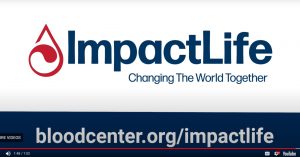
The new ImpactLife logo and updated website.
The name – which became effective Monday, May 3 – represents the Davenport-based nonprofit community blood provider to 120 hospitals in Illinois, Iowa, Missouri, and Wisconsin. Serving residents of 116 counties (88 of which are in the MVRBC service area), the organization also previously included Central Illinois Community Blood Center (CICBC) and Community Blood Services of Illinois (CBSI).
In a Monday news release, CEO Mike Parejko stressed the importance of having a single, common identity.
“We are proud of our strong history and the reputation we have developed under our previous names, but the time has come to bring all of our team, donors, and volunteers under a shared identity that emphasizes the impact of our work on the communities we have the pleasure

ImpactLife CEO Mike Parejko in a new video about the name change.
to serve,” he said.
“Our organization will be stronger and more efficient when we operate under a single brand instead of three,” said Parejko. “With our growth, it has become abundantly clear this is the time to move forward under a single name.”
The CICBC (based in Springfield, Ill.), CBSI (based in Urbana, Ill.), and MVRBC were all established independently in the 1970s. The Central Illinois center and Mississippi Valley first merged in 2010, and that organization merged with CBSI in 2011, under the former Davenport-based CEO Dave Green. The single entity now has a service region that extends from Madison, Wis., to St. Louis, Mo.
The name change was led by an internal 28-person project team with representatives from all of the Blood Center’s departments and with market research provided by an agency with expertise in developing names for products and organizations.
The year-long project included research with blood donors, blood drive coordinators, the center’s Board of Directors, employees, community members, and representatives from hospitals the blood center serves.
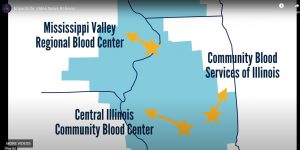
The ImpactLife service area consists of 116 counties in Iowa, Illinois, Wisconsin and Missouri.
“This wasn’t just people at headquarters brainstorming together at a table,” Kirby Winn, ImpactLife public relations manager, said Monday. “We wanted to be really inclusive of our organization — all of our staff and teams, and that’s part of why it’s taken some time.
The name change has been in the works for about 10 years, he said.
“At the time of our merger, people talked about it right away,” Winn said of 2011. “But there were so many other critical operational issues and I’m talking about staffing alignment, getting our training and our computer systems and data on the same page. It has long been recognized as something important but less of an impact.”
“We know, of course, that we’re the same organization. But when we talked to the people, we know one person might say, ‘Oh, I work for Community Blood Services or I work for Central Illinois Community Blood Center and he works for Mississippi Valley,’ so we’re better off as a single organization,” he said.
“It’s the efficiency when we pull people from different areas, especially at our larger events, when that happens, when you need additional

Kirby Winn is public relations manager for ImpactLife, formerly Mississippi Valley Regional Blood Center.
resources,” Winn said of public confusion about the three groups under one umbrella. “We want to have one face and one point across the region that we serve.”
In the last two years, the Blood Center added service areas in south central Wisconsin, like hospitals in Madison, Janesville, Baraboo, and Stoughton, Winn said.
“We certainly didn’t want to use the Central Illinois name there or the Mississippi Valley Regional Blood Center name,” he said. “Within our industry, people really know who we are because it’s a longtime, well-established organization in the industry. But we’re back to these new communities and people in Baraboo who’ve never heard of us or people in Madison, and now we’re doing blood drives.”

The red blood drop logo has been updated for ImpactLife.
Covid-19 also delayed the name change process, he said. Through social media in recent years, the three groups would not use their names as much, but say the message of “Give blood, save lives,” Winn said. “It has been in the strategic plans and on the planning horizon.”
Since the time of their merger, the blood center’s legal and regulatory name (for licensing purposes) has been maintained as Mississippi Valley Regional Blood Center, but the organization has done business as all three names in various parts of its service region.
The legal and regulatory name will remain unchanged and the blood center will do business as ImpactLife with all communities and partners moving forward, its release said.
ImpactLife operates 19 donor centers and holds approximately 5,000 mobile blood drives annually to provide blood components needed for patient transfusions at hospitals throughout the four-state region.
ImpactLife is now in the process of updating all points where the name and logo are used, including building signs, vehicles, printed material, and apparel.
Feeling many impacts from Covid
The first direct impact of the pandemic came in the form of blood drive cancellations in mid-March, as schools, churches, and businesses either closed or limited in-person contact to limit the spread of Covid-19. By year’s end, the Blood Center would have to make up for more

There’s still an urgent need for blood donors. Call 800-747-5401 or visit www.bloodcenter.org.
than 40,000 donations lost in canceled blood drives, according to its 2020 annual report.
ImpactLife organizations hosted 4,300 total blood drives in 2020, compared to 5,000 in 2019, Winn said. The year-end figures for total donations are:
- 194,455 in 2020 donations (all procedure types), compared with 200,879 in 2019 – a 3% decrease in total donations.
- 158,757 in 2020 whole blood donations, compared with 169,006 in 2019 – a 6% decrease.
- 88,061 in 2020 individual donors, compared to 97,550 in 2019 – a loss of 10% of individual donors)
An individual donor can make multiple donations, Winn noted. “That’s why we have a smaller percentage decrease in total donations than the decrease in donors. Many of our Covid-19 Convalescent Plasma donors gave multiple times. They were highly motivated donors and eligible to give frequently because plasma donations can be made more often than whole-blood donations.”
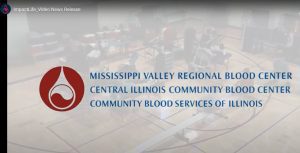
ImpactLife is comprised of three formerly independent blood providers.
Covid convalescent plasma contains antibodies to the Covid virus, and is given by donors who have recovered from a Covid infection, to aid in treatment for infected patients.
The primary procedures for all donors are:
- Whole blood — all components are collected at once (red blood cells, platelets, and plasma – also the white cells, but those are filtered off after donation)
- Platelet — platelets are collected using a machine at the side of the donor chair (remaining components returned to the donor)
- Plasma — plasma collected using a machine at the side of the donor chair (remaining components returned to the donor)
- Double red cell — double unit of red cells collected using a machine at the side of the donor chair (remaining components returned to the donor)
- Covid-19 Convalescent Plasma — plasma collection, but from a donor who recovered from a Covid infection
In early March 2021, with the decrease in hospitalization rates for Covid-19, demand for Covid convalescent plasma (CCP) dropped to the
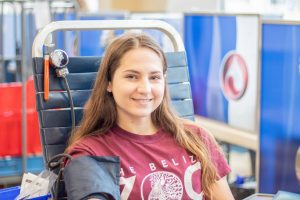
The ImpactLife headquarters and donor center is at 5500 Lakeview Parkway, Davenport.
point at which current inventories are sufficient to meet projections of patient need, an ImpactLife release said.
The blood center first began working with donors who recovered from a Covid infection in April 2020, when the first donors in our region who had recovered from a Covid infection became eligible to donate. During 11 months of collection, 2,508 donors gave more than 6,600 units of CCP for patient care.
“The community response to our CCP program has been nothing short of amazing,” Pete Lux, director of donor and patient services, said in the March release. “I’m so proud of everyone on our team who has helped recruit, qualify, schedule, test, process, and deliver donations over the last year. Most of all, we have the individual donors to thank for stepping forward to help Covid-19 patients.”
CCP units may be stored in a frozen state for up to one year after the date of donation. Current inventories, locally and nationally, are deemed sufficient to meet ongoing patient need.
After the start of the pandemic, blood center staff members who could work from home were instructed to do so, using remote technology to access documents, meet with their peers, and share information.
All staff, donors, and volunteers were required to wear masks or face coverings inside facilities and blood drives. Donors were required to make appointments for donation, to better manage social distancing and control flow at blood drives and donor centers.
Maintaining appropriate staffing levels became a challenge as employees were quarantined either due to illness or exposure to the Covid-19 virus, the annual report said.
Winn said Monday that in the early part of the pandemic, there was a drop nationwide in the use of blood, because elective surgeries were being postponed.
A 2020 boost in revenue
Overall, ImpactLife saw an increase in total revenue for 2020 — $73.16 million, compared to $70.63 million in 2019, in part because of the
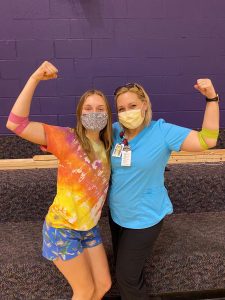
Two women recently celebrated donating blood.
demand for CCP, Winn said. “As we moved through Covid-19, convalescent plasma became a real source of emphasis,” he said, noting that was a large revenue source that the organization didn’t have in past years.
The blood center also moved infectious disease and ABO blood testing operations from the Davenport headquarters to a new facility operated by the National Blood Testing Collaborative (NBTC) in June 2020. NBTC provides high-quality testing services, at cost, to its owner-members. MVRBC was one of nine U.S. blood centers to establish NBTC in 2019 and worked with fellow members of the co-op to design and build the new laboratory in Atlanta, Ga.
Among other 2020 accomplishments were:
- Launching a new and improved version of the website, www.bloodcenter.org.
- Holding the ribbon-cutting for a new Donor Center in Peoria, Ill.
- Winning the Public Relations Campaign of the Year Award from American’s Blood Centers.
The March 2021 release noted the blood center continues to recover from blood drive and appointment cancellations during the pandemic, and “has a critical, ongoing need for red blood cell, platelet, and plasma donations from all blood types.”
“Blood products are used with patients in treatment for cancer, to respond to trauma, and for lifesaving surgical procedures,” said Amanda Hess, director of donor and public relations. “All of these reasons, and more, still occur during the pandemic.”
To schedule an appointment for donation, call 800-747-5401, schedule online at www.bloodcenter.org or via the Blood Center’s mobile app (www.bloodcenter.org/app).
You can also find more about ImpactLife at @impactlifeblood on Facebook, Twitter, Instagram, YouTube, and Snapchat.




